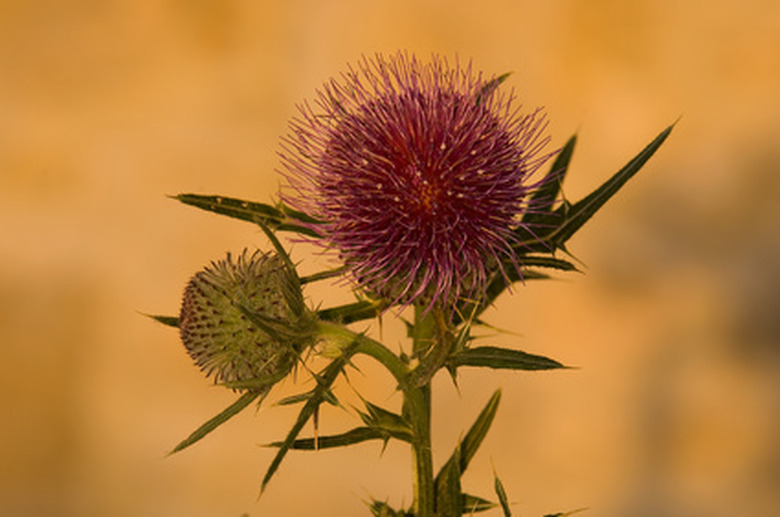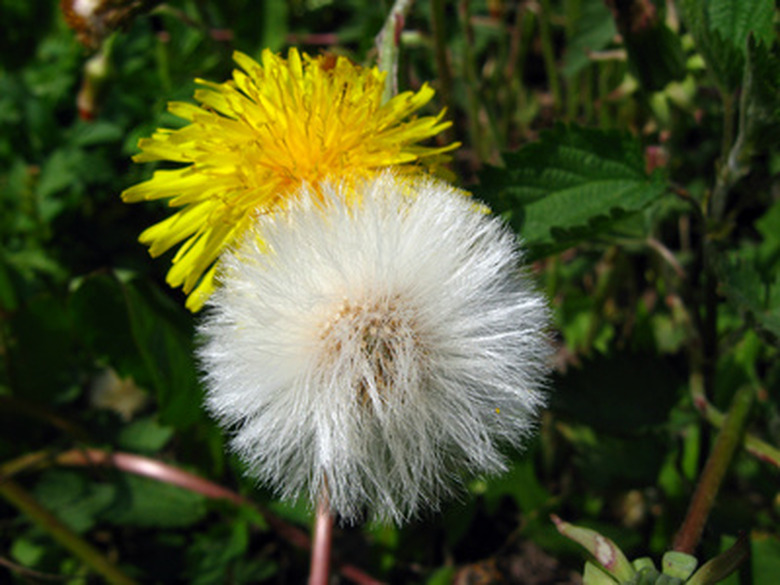Common Lawn Weeds In Florida
Many different species of weeds invade Florida lawns and landscapes, but a few are more prolific in the state's climate than others. There are three main kinds of weeds: broadleaf weeds, grasses and sedges or rushes. Properly identifying your lawn weeds is the most important step to controlling the invasive plants.
Black Medic
Most commonly found in Florida lawns that are low in nitrogen, black medic (Medicago lupulina) is a perennial weed with a low, spreading growth habit. Black medic has clover-like leaflets arranged in groups of three. Its clusters of bright-yellow blooms are globe-shaped and grow atop short branches. To get rid of black medic, feed your lawn with a fertilizer containing a 2:1 ratio of nitrogen to phosphorous. If the weeds persist, treat the lawn with a selective herbicide made for broadleaf weeds when the black medic is in the seedling to flowering stages.
- Many different species of weeds invade Florida lawns and landscapes, but a few are more prolific in the state's climate than others.
- If the weeds persist, treat the lawn with a selective herbicide made for broadleaf weeds when the black medic is in the seedling to flowering stages.
Florida Pusley
An annual lawn weed found during the summer, Florida pusley (Richardia scabra) has hairy, opposite leaves growing atop hairy, erect stems. Florida pusley produces clusters of white, star-shaped flowers and spreads aggressively by seed. Keep your lawn irrigated during the hot summer months to help your grass compete, and remove smaller infestations by hand. If you have a larger infestation of Florida pusley in your lawn, apply a post-emergent broadleaf herbicide when the weeds are in the seedling to flowering stages.
Yellow Woodsorrel
Yellow woodsorrel (Oxalis stricta) is an upright perennial weed with heart-shaped, pale-green leaves that grow in clover-like clusters of three. Spread by abundant seeds, yellow woodsorrel blooms in bright-yellow flowers with five petals. Get rid of this weed with a selective broadleaf herbicide, as well as by pulling it by hand.
- An annual lawn weed found during the summer, Florida pusley (Richardia scabra) has hairy, opposite leaves growing atop hairy, erect stems.
Bull Thistle
A biennial weed with large, coarsely toothed and spiny leaves, bull thistle (Cirsium vulgare) produces purplish-rose flowers atop a woody stalk during its second year. Because it spreads by seeds, remove bull thistles from your lawn by cutting them below the crown, preferably in early spring before they begin flowering. You also can spray the bull thistles with a post-emergent herbicide while the weeds are in the flowering stage.
Broadleaf Plantain
Plantains (Plantago rugelii and P. major) have large, rounded leaves with deep veins and wavy edges that create a rosette. Found in Florida lawns from June through September, the broadleaf plantain grows a long seed head that looks like a rat tail with small yellow flowers. Because it spreads both by seeds and shoots developing from the roots, this weed can be difficult to control. Remove broadleaf plantains by hand, ensuring that you dig up the entire root system, or apply a selective broadleaf herbicide in mid-spring or fall.
- A biennial weed with large, coarsely toothed and spiny leaves, bull thistle (Cirsium vulgare) produces purplish-rose flowers atop a woody stalk during its second year.
- Because it spreads by seeds, remove bull thistles from your lawn by cutting them below the crown, preferably in early spring before they begin flowering.
Quackgrass and Crabgrass
Spreading by rhizomes, quackgrass (Agropyron repens) is a perennial grass-like weed with bluish-green blades and spiky seed heads. Crabgrass (Digitaria sp.) is also a grassy weed, but it's an annual with yellowish-green blades that are flat with sharp points. Crabgrass produces seed heads with three to 10 finger-shaped spikes that are purplish to tan. While crabgrass will die off during frosts, both quackgrass and crabgrass in Florida lawns can be controlled using a post-emergent selective grass herbicide.
Dandelions
Perennial weeds that spread by seeds, dandelions (Taraxacum officnale) have large yellow flowers that turn into seed-filled round puffballs atop short stems. The stems grow from a base rosette of oblong, deeply-lobed and narrow leaves. In Florida, the dandelion seeds germinate in fall. Get rid of dandelions by applying a post-emergent selective herbicide in fall after the seeds germinate and the weeds are young.
- Spreading by rhizomes, quackgrass (Agropyron repens) is a perennial grass-like weed with bluish-green blades and spiky seed heads.
- Perennial weeds that spread by seeds, dandelions (Taraxacum officnale) have large yellow flowers that turn into seed-filled round puffballs atop short stems.
Nutsedge
Yellow (Cyperus esculentus) and purple (C. rotundus) nutsedges are perennial grass-like weeds with triangular stems. These nutsedges have narrow, waxy, blade-like leaves with prominent midribs, or central leaf veins. Nutsedges spread by underground rhizomes and tubers. Yellow nutsedge flowers are yellowish, while purple nutsedges have reddish-purple to brownish seed heads. Control nutsedges with applications of post-emergent herbicides while the weeds are actively growing and in the three-leaf to flowering stages.
Goosegrass
Goosegrass (Eleusine indica) is an annual grassy weed that grows in clumps. It has silvery or whitish flat stems at the base of the leaves. Emerging in summer in Florida lawns where soils are compacted, goosegrass has folded leaves and germinates later than other annual grasses. Goosegrass produces two to 10 zipper-like spikes of seed heads, and the weed persists despite close mowing. Get rid of goosegrass invasions by aerating your lawn and applying a post-emergent selective herbicide.
- Yellow (Cyperus esculentus) and purple (C. rotundus) nutsedges are perennial grass-like weeds with triangular stems.
Spurge
Spurge weeds (Euphorbia maculate and E. supine) are annuals that sprout in Florida lawns during summer when soil temperatures reach 85 degrees Fahrenheit or hotter. Spreading by abundant seeds, spurges have reddish, low-growing stems that fan out and create a dense mat of small, oval leaves. Spray the weeds with a selective broadleaf herbicide while they're actively growing.
Dollarweed
Dollarweed (Hydrocotvle sp.), also called pennywort, is a perennial that spreads in Florida lawns by seeds, rhizomes and tubers. Dollarweed most often invades lawns that stay moist to wet and is commonly found along the Atlantic coast of Florida. This weed has umbrella-shaped, round leaves with scalloped edges atop erect stems. Dollarweed also produces small, five-petaled flowers in clusters atop long stems. Control dollarweed with a post-emergent broadleaf herbicide applied while the weed is actively growing.
- Spurge weeds (Euphorbia maculate and E. supine) are annuals that sprout in Florida lawns during summer when soil temperatures reach 85 degrees Fahrenheit or hotter.

